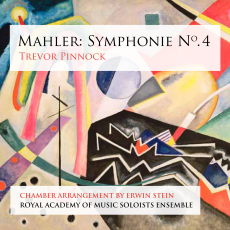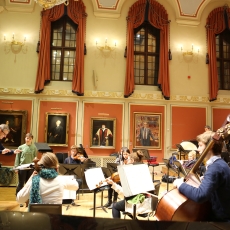Trevor Pinnock and RAM - Mahler - The Guardian
The Verein für Musikalische Privataufführungen (the Society for Private Music Performances) was founded by Arnold Schoenberg and Alban Berg in 1918, to provide a forum for contemporary music in postwar Vienna at a time when mainstream concerts were becoming ever more reactionary. Attendance at the society's concerts was by subscription only; critics were banned, applause was prohibited and no programmes were published in advance. Up to the end of 1921, when the economic crisis in Austria forced it to close, more than 100 concerts were given. The repertoire was by no means confined to the Second Viennese School and its supporters, but also included music by Reger, Strauss, Mahler, Debussy, Ravel, Stravinsky and Bartók. Large-scale orchestral works were regularly performed in specially commissioned arrangements that were usually made under Schoenberg's strict supervision. Some of them were for one or two pianos, but others used an instrumental ensemble in which a piano and a harmonium supplied any missing harmonies or details.
Two of those chamber reductions launch a new series of discs for Linn by the Royal Academy of Music's Soloists Ensemble. For many years the version of Debussy's Prélude à l'Après-Midi was thought to have been Schoenberg's own, but it now seems to have been the work of one of his pupils, Benno Sachs. Another pupil, Erwin Stein, who also became the society's director of performances in 1920, was responsible for rescoring Mahler's Fourth Symphony for a soprano and 14 instruments. The original instrumental parts have been lost, but have subsequently been reconstructed from Stein's annotated score of Mahler's original.
Both these ensemble arrangements have been recorded before, but together these wonderfully lucid performances, conducted by Trevor Pinnock, make a fine start to the series. The myriad colours of Debussy's scoring in the Prélude are carefully preserved, even if the result is more like a pastel drawing than an oil painting, while the much more drastic compression of Mahler's soundworld reveals details that are usually never heard in an orchestral performance. The percussion occasionally overwhelms the other instruments, but to counterbalance that, the introduction of the soprano soloist (Sónia Grané here) for the final movement becomes utterly natural, and creates all kinds of unexpected connections, not only with Mahler's own songs but with Schoenberg's works, too. A satisfying, thought-provoking disc.


